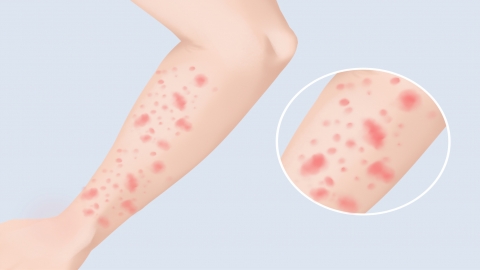How to relieve itching caused by skin allergies
Generally, itchy skin allergies may be caused by factors such as dry skin, dietary factors, contact dermatitis, eczema, urticaria, and others. Treatment options include general treatments and medication therapy, under a doctor's guidance. It is recommended to seek timely medical advice and follow the doctor's instructions for treatment. Detailed explanations are as follows:

1. Dry Skin
When the environment is dry, or when bathing frequently or using harsh cleansing products, increased moisture loss and impaired skin barrier function may occur. As a protective mechanism, the skin may produce a stress response that stimulates nerve endings, resulting in itching. No medication treatment is generally needed. It is important to maintain indoor humidity, reduce the frequency of bathing, and choose mild, moisturizing shower products.
2. Dietary Factors
Some foods contain specific components, such as heterologous proteins in seafood or urushiol in mangoes, which can act as allergens. When these foods are ingested, the immune system may recognize them as harmful foreign substances, triggering an immune response that leads to skin itching. Usually, no medication treatment is required. A balanced diet and avoiding excessive consumption of allergenic foods at one time are recommended in daily life.
3. Contact Dermatitis
Contact dermatitis is typically an inflammatory reaction triggered when the skin comes into contact with exogenous substances, such as fragrances or preservatives in cosmetics. These substances may combine with proteins in the skin to form complete antigens, stimulating the immune system to mount a response. Inflammatory mediators then stimulate nerve endings, causing itching. Symptoms may also include erythema, papules, and vesicles. Patients may use medications such as desonide cream, hydrocortisone butyrate cream, or mometasone furoate cream, as advised by a doctor.
4. Eczema
Eczema may be associated with multiple factors, including genetic predisposition, immune dysfunction, environmental influences, and impaired skin barrier function. Genetic factors may make individuals more susceptible to eczema. When exposed to environmental triggers such as dust mites, pollen, or chemical substances, immune dysfunction and impaired skin barrier function may occur, increasing the skin's sensitivity to external stimuli and triggering inflammation and itching. Other symptoms may include scaling, crusting, thickened skin, and rough patches. Patients may use medications such as calamine lotion, halometasone cream, or fluticasone propionate cream, under medical supervision.
5. Urticaria
Urticaria is often triggered by food, medications, infections, physical factors, emotional stress, or autoimmune reactions. Allergens can activate immune responses, leading to the release of histamine and other active mediators from mast cells. Histamine causes dilation and increased permeability of small blood vessels in the skin and mucous membranes, resulting in itching. Symptoms may also include wheals and pain, and the condition tends to recur easily. Patients should follow medical advice and use medications such as olopatadine tablets, astemizole capsules, or emedastine difumarate sustained-release capsules for treatment.
In daily life, it is important to avoid known allergens, choose mild and non-irritating skincare and cleaning products, wash clothes frequently, maintain a clean living environment, and reduce the proliferation of allergens such as dust mites and mold.








